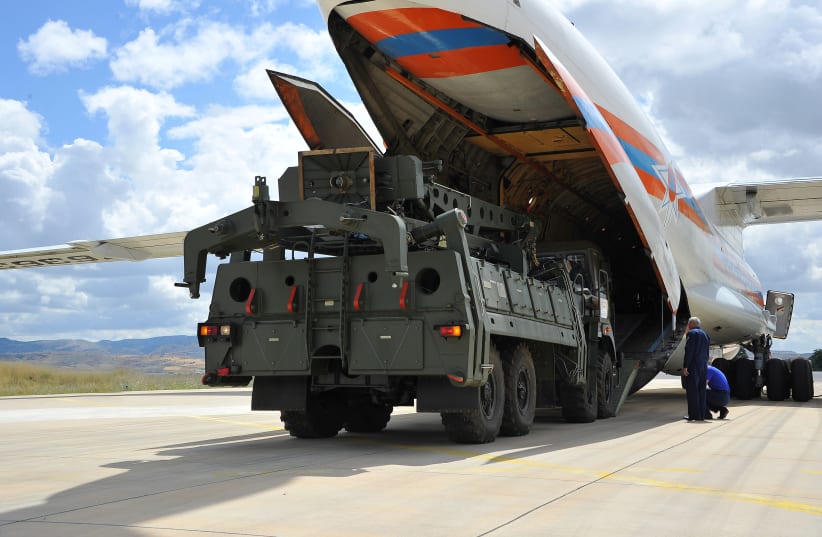Turkey showed that it thinks nothing of US concerns about its acquisition of the S-400 by testing the radar against F-16s on Monday.
The US has opposed Turkey’s acquisition of the Russian system since 2017, and Washington has begged Ankara not to activate it, inviting Turkish President Recep Tayyip Erdogan to Washington to offer Turkey incentives and blocking Congressional support for Armenian genocide recognition.
Knowing that it risks more updates to its F-16s and any F-35 deals that were in the works, Turkey nevertheless sought to test the S-400 radar and do so publicly. The idea is to show that Washington has no influence over Ankara, and that Turkey will do what it wants and Washington will either get on board or accept it.
This was Turkey’s model for the invasion of Syria in October – hand the US a fact on the ground through the invasion, and then get Washington to come to the table. Turkey’s leadership under US President Donald Trump is primarily interested in paying lip service to threats, but that Trump is skeptical of his own State Department, security establishment and military, and is more likely to side with a tough-talking Turkey than State Department “concerns.”
Turkey has so little interest in the apparent crisis and importance of the S-400 it was testing that the president went to Qatar, a real ally of Turkey, to press Ankara’s influence. Turkey and Qatar have been allies for many years, both supporters of the Muslim Brotherhood in Egypt and both linked to Hamas and other causes such as Libya’s Tripoli government, and working with Iran.
However, since 2017, when Saudi Arabia led other Gulf States to break relations with Doha, Turkey has been Qatar’s main backer. Erdogan embraced the Qatar’s Emir Tamim bin Hamad Al Thani and sought to boost bilateral relations in his trip on Monday. “We have deep relations in the Gulf,” Erdogan said, and that Qatar’s security and defense cooperation are the backbone of the Doha-Ankara alliance. Turkey also hopes the crises between Qatar and other countries will be solved soon.
According to the pro-government channel TRT, Turkey said that a new military base had been constructed, and “will be named after Khalid bin Walid, a famous Muslim commander.”
The Qatar-Turkey love affair bloomed as Turkey carried out airstrikes against the PKK in northern Iraq, and as terrorists blew up a shop in Azaz. No matter. For Ankara, the real important thing is the Qatari relationship because of money. Airstrikes, which Syrian rebels blamed on Moscow, were being prepared the night of November 25 as Turkey and Qatar discussed regional affairs. Turkey and Qatar now have a Combined Joint Force Command. The countries are joined in “brotherhood.”
The Qatar relationship is important, but Turkey’s real investment today is an indigenous arms industry. Russia plans to sign a new contract to supply Turkey its S-400 missile systems in the first half of 2020, TRT noted.
In a speech to his AKP Party, Erdogan stressed how Turkey has made major inroads in its own defense industry over the last six years. Turkey is building an army of UAVs, tanks, helicopters and everything else it needs to fight “terrorists.” Turkey has launched three military offensives into Syria and plans to take over more of Syria, according to maps Ankara showed the UN in September.
Now Erdogan says that Turkey will build its own fighter plans in six years. The US has been “unfair” by not sending the F-35 to Turkey. Also, the Turkish president claims the country will begin “producing domestic air-to-air Bozdogan missiles.”
While Erdogan was boasting, the Russians were showing off what they could do with air power across the border. TRT said Russia struck a bakery, and other sources said Russia hit oil and other infrastructure.
Turkey’s role in Syria and drive for more locally made defense technology will continue to frame its relationship with Russia and Iran as it moves away from the US in its policies.
